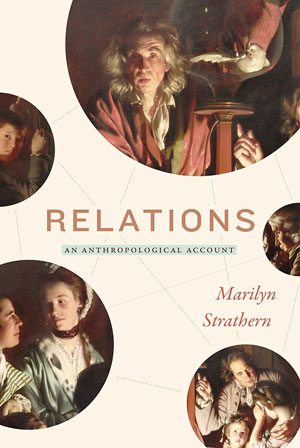
How do anthropologists describe their own practices? Their working concepts would have to be part of it. Nothing could be more diffuse or ubiquitous than the English-language use of relation, yet many socio-cultural anthropologists would claim it as a signature concept for their discipline. It holds a privileged place both in how they think and write and in the social and cultural lives they study. Importantly, uncovering relations that may not be immediately apparent often signals a critical or questioning move. The driving question of this book is how to provide a critical account of that very practice.
English speakers call kinsfolk their relations or relatives. This idiosyncratic usage seeds an exploration of changing articulations in knowledge relations and interpersonal relations over the last three hundred years. Familiar notions of identity, selfhood, consciousness, family, friendship, comparison, connection, affinity, resemblance, similarity, difference, and so forth, acquire new interest. They feed into an argument about the nature of relations that also springs from materials with lives of their own, an unlooked-for outcome being a novel understanding of ‘Western’ (Euro-American) kinship. While the investigation draws on anthropological works from numerous locations, it also touches on different theoretical stances, on critical theory, and on historical interpretations of early modern social life, with a taste of philosophical writings from the time. The reader is invited to observe how relations act and behave (so to speak) in diverse circumstances. We could call it an ethnographic exploration, but—insofar as it too works with relations—it has to move beyond the usual comfort zones of exposition.
Behind the driving question is another driver. Only now do we seem to be hurrying to take action on numerous relational deficits in our understandings of, and care of, an ecologically and politically precarious world. Being critical is also taking care and, when it comes to taking care of relations, taking conceptual care.
Now scholars often criticize the concepts other scholars use in order to herald new horizons: out with the old, in with the new! In this case I wish to criticize a concept—not just to create a wider context (as in critique) but to raise objections (as in criticism)—while not wishing to get rid of it. The reason lies in a conundrum as old as scholarship itself: because the concepts we value also get in the way of what we want to express.
Social anthropology responds to the conundrum like no other discipline in the tools it has at its disposal. It actively invites what it learns from its subjects and objects of study (across the world) to challenge its own modes of exposition. Uncovering relations enables anthropologists to draw things together and give coherent accounts of apparently disparate elements in people’s interactions with one another; at the same time, the very concept of relations may block other understandings, limit what can be conveyed, and even import unwarranted assumptions about the nature of social life.
I turn a question about concepts into an enquiry concerning English language usage of, and thus terms for, relations. Anyone considering how English speakers deploy ‘relation’ and ‘relations’ will find contradictions, illogicalities, overlaps, and all kinds of ambiguities in the way speakers switch between diverse connotations in the terms they use, and move across meanings, inferences, applications, and so forth. The task of understanding what is going on is frequently interpreted as clarifying speakers’ usages for them. This is not the intention here.
Many disciplines explicitly aim to clear the air by cleaning up words and terms in preparation for defining the concepts they deploy. Others rely on protocols of data collection that purify the material they work with. By contrast, the anthropological intervention I am proposing focuses on real time usage. It is in slippages in the way terms are used that other concepts form, and what from a purist point of view look like contaminations may turn out to underlie crucial dispositions or values. Think, for example, of the positive tenor that ‘making relations’ or ‘having a relationship’, can convey. What does that coloring do for using the term in scholarly discourse? And if the early modern philosopher John Locke is accused of confusions, what work (cultural, political, normative work) is confusion doing?
In the past I have been very liberal in articulating relations in the context of studying Melanesian societies, where, as it happens, people did not themselves require special terms to articulate the interdependence of phenomena. Indeed I am talking about a mode of articulation that matters to me very much as a person, although this is not an autobiographical account by any stretch of the word. Rather the account outlines what a colleague once called an ‘expersonated’ (as opposed to an impersonated) self, one’s self known through one’s usages and practices, and specifically apropos the concept of relations through the tools of one’s trade.
If there is a story to be told of how (as a concept) relations in English came to have the purchase it does, some of it may have begun precisely when English speakers started calling family members by existing but then exclusively logical or narrational terms for connections, namely relations and relatives. By contrast with most European languages, this remains a vernacular idiosyncrasy. There is nothing new in such small barriers to translation. That said, teasing out this particular vernacular idiosyncrasy leads to interesting questions about what it is that concepts carry with them, and thus the limits and limitations of their usefulness. English usage seemingly dovetails concrete ways of thinking of about persons, as an exercise in kin-making, with an abstract comprehension of relations, as an exercise of knowledge-making. One wants to ask what kind of world makes such a twinning possible.
It might come as a bit of a surprise that there is so much in the book about friendship. Perhaps because I know so little, I find some of the literature on early modern England fascinating in this regard. Perhaps what will pique the reader’s interest is to see the way in which friendship segues into kinship. I have surprised myself, at any rate, on this score.
Historians have long been alive to the temptation to think one knows what friendship is. Intriguing for example are present-day misunderstandings of companionate relations as flourished across pre-modern Europe. So what else do we need to be alert to? As it turns out, the attributes of friends and relatives have over time diverged and converged in quite specific ways.
At any rate all this made me think afresh about twentieth century anthropological accounts of kinship and friendship, and I found myself speculating on an old controversy: the glaringly diminished place of family and kin in modernity. Of course the controversy hardly belongs to anthropology alone. Political writers pondering long ago on an emergent sense of society and state began a conversation that has lasted three centuries. I join the conversation with some thoughts of my own about how English speakers link up different aspects of their social lives.
Take seventeenth- and eighteenth-century usages of ‘society’ and ‘association.’ These seemingly reflect back something of the positive tenor there is to making relations that has already been mentioned. At one place the book touches on David Hume’s eighteenth-century ruminations on human nature. He showed himself as enamored of the associational facility of linking thoughts as he was of the convivial nature of being in company. Indeed he connected them: resemblances between people are like connections between ideas. Incidentally, Hume was thinking of social circles in general, not of kin relations at this point—it is as though the latter had already been pushed to one side. Of course as with any literary piece one has to consider metaphor, and I could not resist a glance at some of the arguments of the time about decorating speech. An interesting juncture is when ‘family’ loses its power as a metaphor for ‘state’.
The cover that Duke University Press designed for the book is taken from a painting frequently reproduced to evoke the Enlightenment, Wright’s An experiment on a bird in an air pump. The scientific revolution domesticated: at a private house an itinerant lecturer is demonstrating the effects of air by withdrawing it from a bell jar in which a bird flutters. Several people gathered to watch are held by the painter in various relations of power (the observer with his hand on a watch), concentration (on learning what will happen next), comfort (embracing the youngest watchers there), and indifference (between two who have eyes only for themselves). There have been many attempts at identifying the personages. Generically, we would recognize a circle of friends and relations.
If the book hopes for anything, it is for a cultivation of alertness. It is no big news that, as they are articulated, concepts carry cultural baggage. When the concept at issue is relation, we need to scale up that alertness, to see its cosmological import. For it is not—even if we wished—alterable or discardable at will. This is especially true of knowledge relations, of the manner in which people go about description, explanation, exposition. Throughout, the book makes it its business to allude, however briefly, to non-English-speaking contexts that tweak the distinctiveness of English usage here. The positive tenor (‘friendliness’) of relations, to return to the example, which privileges similarity as ground for connection, becomes an impediment to expressing the value some cosmologies put on relating through difference. The impediment feeds bitter anthropological controversy over the possibility or impossibility of identifying radical alterity.
A take-home message is that for all the important work that the relation does, we need to be wary of its limits and excesses. While the message springs from criticizing English usage, such usage both does and does not share elements with its European counterparts, and the book provides some navigation for the point. More significantly, apropos English, we are talking of an international language with the power to mold concepts in its wake.
The relation’s important work is evident. There is huge pressure in today’s world to rediscover how interconnected everything is, to treat interdependence as equally a natural and a moral necessity, to appreciate the value of interpersonal relations suddenly thrown into relief by a pandemic for which—for those who can—self-isolation is mandated. English speakers in particular have to go on telling themselves about the significance of relations and the interrelationship of phenomena.
And this is because they are at the same time construing the world otherwise. This is the relation’s excess. Too often the world appears first as an assemblage of discrete items, and only secondarily as a multitude of items intermeshed, linked up, connected (whether or not the items in question can imagine themselves this way). There has been a century of criticism, with anthropology but one among many voices, to try to dislodge the prioritizing of discreteness. But what if impediment is embedded in our very means of expression? Think of the preposition ‘between,’ for example, the construction that renders relations as somehow lying between entities. It allows the entities to be construed as pre-existing, as though they were otherwise independent individuals, while relations take on a substantial character of their own, as in emphasizing shared similarities. To re-think the individual also means re-thinking (the exposition of) relations.
A final note. Nationalist or racist rhetorics, reinvented anew for global times, frequently rest on appeals to self-resemblance or similarity that exclude (make ‘other’) what or who is taken as intrinsically dissimilar. This is not restricted to English speakers; but one way users of English do it is through how they imagine relations.


Marilyn Strathern is Emeritus Professor of Social Anthropology, and Life Fellow of Girton College, University of Cambridge. She made her name with comparative theorizing on Melanesia (The Gender of the Gift), and (as in After Nature) with critical interventions in debates stimulated by the Western paradigms of nature-culture and individual-society.